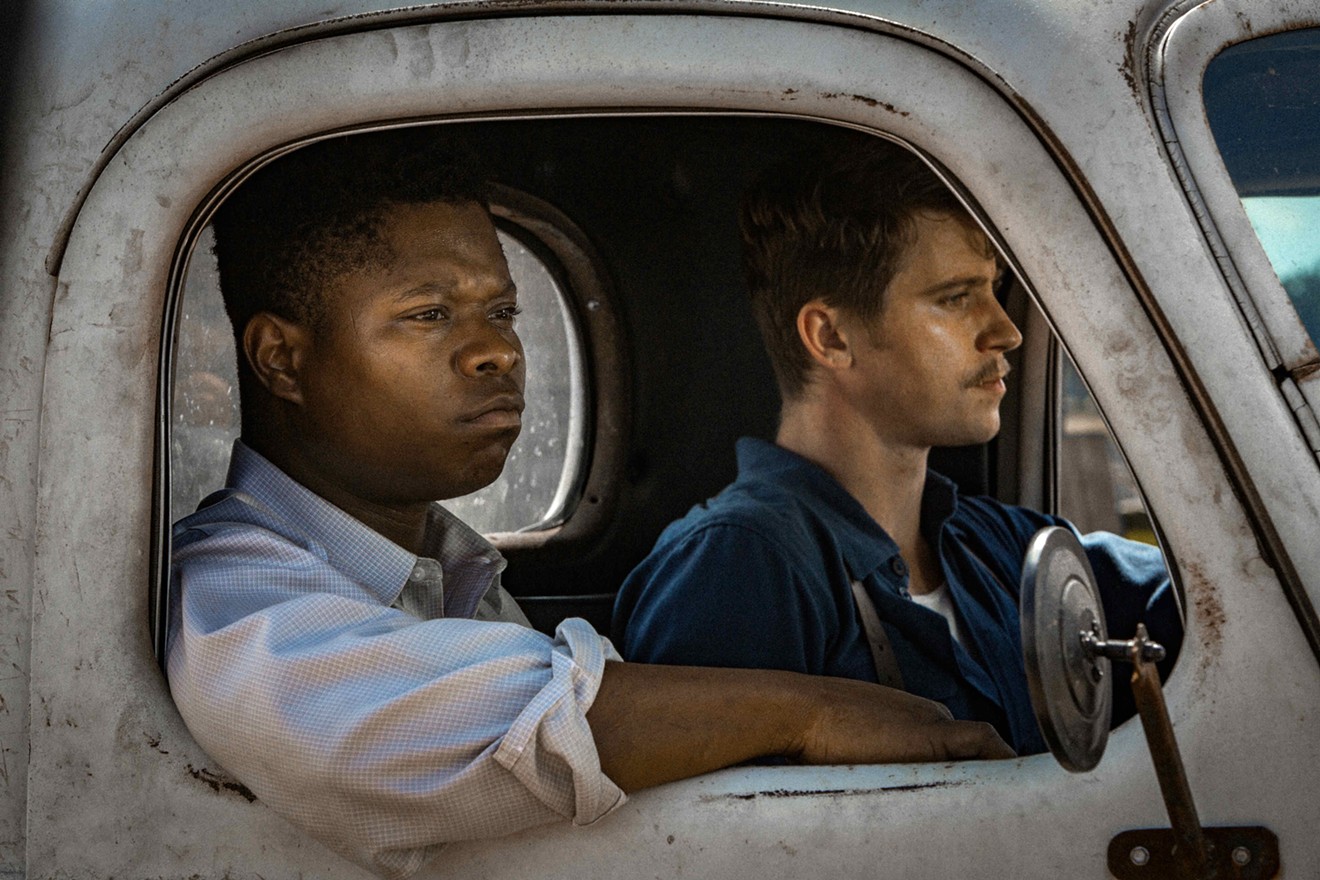Mudbound premieres on Netflix Nov. 17“I dreamed in brown,” Laura McAllan (Carey Mulligan) muses in voice-over as Mudbound begins, and you have to believe her. Dee Rees’ gorgeous film opens with the sound of thundering rain and footsteps in muck. Set on a cotton farm in the Mississippi Delta in the 1940s, it offers a full sensory experience, capturing not just the sounds and sights but the smells and tastes of country life. This is a place where white men rule, and yet, white or black, each character is equally at the mercy of the elements, especially the rain and concomitant muck, which moors them indoors for days. Nothing to do but watch it pour down and tally up the time lost.
Directed by Rees and adapted, with Virgil Williams, from the 2008 novel by Hillary Jordan, Mudbound is a true ensemble piece; the film explores race and class in the South through the story of two fated families, narrated by several divergent characters. We’re first introduced to Laura as a 31-year-old virgin living with her parents in Memphis; when her brother brings his boss Henry (Jason Clarke) home for dinner, it’s not long before Henry and Laura are married with two young girls. “By the way,” Henry informs Laura one night in bed after rolling off her, “I bought a farm in Mississippi.” They leave in three weeks, and they’re taking Henry’s Pappy (a steely eyed Jonathan Banks) with them. The five of them end up in a shack with no running water or electricity, cut off from town by a wooden bridge that floods when it rains, not far from their black sharecropper tenants, Florence and Hap Jackson (Mary J. Blige and Rob Morgan).
The trouble begins when the Jacksons’ oldest son Ronsel (Jason Mitchell) comes home from World War II, where he was a tank commander, and befriends Henry’s dashing younger brother Jamie (Garrett Hedlund), a fighter pilot also just back from the front. “Over there, I was a liberator,” Ronsel remarks. “People lined up in the streets cheering for us.” Not so in his rural Mississippi hometown, where Pappy McAllan confronts a still-uniformed Ronsel at the general goods store and insists he leave through the back door. “Just not used to walking away from a fight,” Ronsel tells his parents after he’s forced to apologize for “talking back.”
Ronsel can no longer abide the day-in, day-out oppression of life in the Deep South — the constant exploitation of his family’s labor, both physical and emotional. “I didn’t have the luxury of only loving my own children,” Florence explains in voice-over after she agrees — what choice does she have — to leave her family for a few days to help take care of Laura’s sick daughters. It’s not out of the kindness of her heart, no matter how benevolent Laura may be; reflecting on her own mother’s caregiving for other people’s kids, Florence says, “Now I know that love is a kind of survival.”
If love is survival, under Jim Crow it also carries the seeds of destruction.
tweet this
If love is survival, under Jim Crow it also carries the seeds of destruction. Ronsel and Jamie’s friendship invites trouble, and they know it. But fresh off an experience that’s changed them both irreversibly, and drifting aimlessly, bitterly, through their postwar lives, they slide into an easy rapport over cigarettes and booze. Jamie is effortlessly but dangerously charming, as both Ronsel and Laura, with whom Jamie has undeniable chemistry, eventually come to learn. It all builds, inevitably and yet subtly, toward tragedy. Mudbound might alternatively be titled This Is Why We Can’t Have Nice Things.
The movie turns on a series of revelations about the characters, whose hushed, intimate narration — split between Laura, Jamie, Ronsel, Hap and Florence — reveals rich inner lives. “What good is a deed?” Hap wonders as he gazes out over the farm at dusk, taking stock of the land that his ancestors tilled until they died but never owned. The laws of the land, he concludes, “say you need a deed, not deeds.” Rees seamlessly glides from one point of view to the next, the voice-overs shifting with the wind. It doesn’t take long for us to truly care about these people and what happens to them — to feel the full weight of their circumstances.
Mudbound accumulates meaning through a kind of layering. The Brooklyn musician Tamar-kali contributes a striking, effective score, her first for a feature film, that is sparing but powerful, a Jaws-esque “dum-dum” that echoes the beating of a panicked heart. Voice-overs build on top of voice-overs, and we feel as if we’re simply getting to know these people a little better, even while Rees is gesturing toward things to come. The result is a deeply engrossing film — its two-plus hours whiz by — about stumbling one step forward and two steps back toward a more enlightened existence.
This story of two families united by circumstance and, as the title suggests, bound by their debt to the land, is a micro version of a larger story about systemic racism in America — a mighty force that will not simply yield to a handful of the “good ones.” Yet, despite its often-brutal realism, Mudbound isn’t masochistic; it leaves room for hope, and argues fiercely for love.











